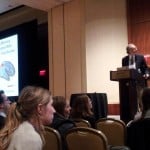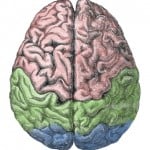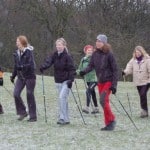CNS 2014 Blog Our cognitive fates are not sealed – that was a powerful message that came out yesterday from a session on developmental cognitive neuroscience at the CNS meeting in Boston. In four talks, speakers laid out new ways neuroscience findings can help children learn, even if they are experiencing challenges because of a […]
The Social Circuits that Track How We Like People and Ideas
CNS 2014 Press Release Boston – April 7, 2014 – Whether at the office, dorm, PTA meeting, or any other social setting, we all know intuitively who the popular people are – who is most liked – even if we can’t always put our finger on why. That information is often critical to professional or […]
What Shapes a Child’s Sense of Humor?
CNS 2014 Blog You see a man in a tight-fitting scuba diving outfit approach the water and slip and fall – pretty funny stuff, right? New research tested this bit on children to see how their brains respond to humor. While the children found it funny, kids who rated themselves as having a lower sense […]
Memories of a Man Who Revolutionized How We Understand Memory
CNS 2014 Blog: Keynote Address by Suzanne Corkin Let’s test your memory: What did you eat for dinner last night? That’s an easy answer. How about what’s the capital of Paris? For most, that’s easy as well. How about this one: How do the pedals work on a bike? That one may be tougher to […]
Children Need to Learn Context to Know When to Stop
CNS 2014 Blog: Q&A with Christopher Chatham It’s happens to all of us: times when we simply cannot stop ourselves mid-action, whether running a yellow (or red) light, making an inappropriate comment, or reaching for our buzzing phone during dinner. Most of the time, adults can overcome these impulses. Children, however, are notoriously different – […]
Fairness Comes Down to Individual Differences in Gut Reactions
Q&A with Christopher Frith We all want to be treated fairly but some of us care more about fairness than others. How you choose to split money with another person in a game says a lot about your view of fairness, researchers have found. New work reveals how differences in our choices to share resources […]
Our Visual World is Not Fact: Our Highly Flexible View of Race, Gender, Emotion, and More
CNS 2014 Blog Part 2 of 2 about the role of social context in how we see people We all know that long-held cultural stereotypes influence how we evaluate and interact with others. But what about how we actually – visually – see people? New research, for the first time, shows that stereotypes change how […]
We See Race – and Create Social Categories – Quickly
CNS 2014 Blog Part 1 of 2 about the role of social context in how we see people When you look at a face, you don’t just see what’s in front of you. You are also processing a whole host of social information about the person. And this happens fast – as quick as one-tenth […]
Our Brains Are Not Split When it Comes to Word Versus Face Recognition
CNS 2014 Blog: Q&A with Marlene Behrmann The idea of being left-brained or right-brained is pervasive in society. But scientists now know that it is not so simple. While some skills may over time develop to depend more on one side of the brain, the two hemispheres work interdependently from birth. Case in point is […]
Exercise for the Aging Brain
We all know that exercise is good for us, and a growing body of research shows that it helps our brains age well too. Scientists are now finding that physical activity is effective both at preventing and treating cognitive dysfunction over the course of a person’s life. Researchers are still working to understand how the […]










